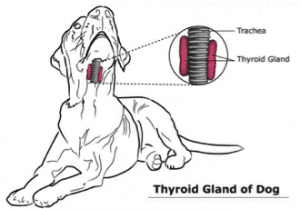Thyroid Cancer In Dogs
What Is Thyroid Cancer (Adenocarcinoma) In Dogs?
The thyroid glands are paired structures located along the windpipe (trachea), about halfway down the neck of dogs.
The thyroid glands produce hormones that are vital for normal body function. Thyroid growths in your dog can be benign (adenoma) or malignant (carcinoma). Benign growths tend to get larger and may produce excess hormones; malignant growths can also spread to other parts of the body.
How To Make An Appointment
Reach out to us at (833) 467-2836, or streamline your request by selecting one of the options below:
Does My Dog Have a Thyroid Tumor?
The majority of dogs that have thyroid tumors have malignant tumors. Thyroid tumors are commonly seen in middle-aged to older large-breed dogs such as boxers, beagles, golden retrievers, and Siberian Huskies. They account for only 1.2–3.8% of all canine tumors.

Signs & Symptoms of Adenocarcinoma (Thyroid Cancer) in Dogs
Here are the symptoms commonly related to adenocarcinoma of the thyroid:
- A large fixed or movable mass in the neck
- Difficulty breathing
- Difficulty swallowing
- Weight loss
- Hoarseness/change in bark
- Increased thirst
- Increased amount and/or frequency of urination.
It is rare for a tumor to affect the hormonal function of the thyroid. However, it can happen, and in those cases, you will see additional symptoms. With hypothyroidism, your pet could be lethargic, have some hair loss, and suffer from exercise intolerance. In the case of hyperthyroidism, dogs can exhibit signs including heart trouble (rapid heart rate and abnormal rhythm), increased hunger and thirst, and muscle tremors.
Diagnosis & Staging a Thyroid Tumor in Dogs
The common diagnostic techniques used to detect thyroid cancer include thorough physical examination, complete blood count, serum chemistry panel, urinalysis, (three-view) thoracic radiographs, and cytologic or histologic evaluation of the regional lymph nodes. Advanced imaging (ultrasound or CT or MRI) is sometimes advised to determine the extent of the disease. Ultimately, a tissue biopsy may be necessary in order to make a definitive diagnosis. Undergoing these tests will help to evaluate the stage that the disease has reached.
Treatment Options for Adenocarcinoma (Thyroid Tumor)
The course of treatment will depend upon the size of the tumor, the extent of pervasiveness, the presence or absence of metastasis, and whether there are signs of thyrotoxicosis (a condition in which the thyroid gland produces excessive hormones). Surgical removal of cancerous thyroid tumors is often difficult because they can invade local blood vessels or other tissues. Therefore, radiation or chemotherapy is most often recommended for those masses that are incompletely removed or are too large for successful surgery. Stereotactic radiosurgery (SRS) is an advanced form of radiation therapy that has been proven effective in treating humans with cancer, including thyroid cancer. SRS is designed to cure cancer, not just ease the symptoms. What sets SRS apart is its unprecedented precision, which enables the destruction of the tumor with minimal damage to the healthy cells around it. SRS is a noninvasive therapy that puts a premium on your pet’s quality of life. There are far fewer treatment sessions, anesthetic events, and side effects, compared to conventional radiation therapy. Radioactive iodine (I-131) treatment has often been shown to be an effective adjunct to the treatment of thyroid tumors. I-131 can be utilized in patients that are poor surgical candidates or where vascular invasion has been identified in spite of surgical removal. A comprehensive examination of the removed tumor is important, to determine if any additional treatments (chemotherapy, radiation therapy, I-131 treatment, etc.) would be beneficial.
Thyroid Tumors in Dogs: Life Expectancy, Survival, & Prognosis
Surgical removal of thyroid tumors has the best outcome if the mass is freely movable, less than 4cm in size, has not spread and can therefore be completely removed. Long-term survival (1 to 3 years) may be achieved in both dogs. It is common for medications to be needed after surgery. If both thyroid glands are removed, your veterinarian may also need to check your pet’s calcium levels several times during recovery. This is because some parathyroid tissue is removed with the thyroid glands, and parathyroid glands play a role in calcium regulation. If surgery is not possible, then SRS may be a viable and successful option.
Meet our Pet Hero – Thyroid Cancer Survivor Liza!
 We’d like you to meet our Pet Hero Liza, a 10-year-old Collie who was successfully treated for thyroid cancer at PetCure Oncology in Cincinnati. Early in 2015, Liza began having health issues that prompted a trip to see the family veterinarian. Liza’s parents explained that she was coughing frequently and seemed to be trying to clear her throat. Her bark had also changed, becoming hoarse and dry. Over time, Liza’s breathing became strenuous and the family felt a lump on her neck…
We’d like you to meet our Pet Hero Liza, a 10-year-old Collie who was successfully treated for thyroid cancer at PetCure Oncology in Cincinnati. Early in 2015, Liza began having health issues that prompted a trip to see the family veterinarian. Liza’s parents explained that she was coughing frequently and seemed to be trying to clear her throat. Her bark had also changed, becoming hoarse and dry. Over time, Liza’s breathing became strenuous and the family felt a lump on her neck…
Questions? We are here to help.
No one knows your pet better than you do. If you see any possible signs of thyroid cancer, do not hesitate to contact your primary care veterinarian for a comprehensive evaluation. As with any illness, early awareness and detection is the key to successful treatment. We invite you to read their stories. If your pet has been diagnosed with cancer, contact our Pet Advocates at 833-738-4376. Our team members are ready to help answer your questions.
RELATED: Thyroid Cancer In Cats
REFERENCES
1. National Cancer Institute Center for Cancer Research. Accessed July 23, 2018, from https://ccr.cancer.gov/Comparative-Oncology-Program/pet-owners/disease-info
2. National Canine Cancer Foundation. Accessed July 23, 2018, from https://wearethecure.org/learn-more-about-canine-cancer/canine-cancer-library/
If your dog is displaying any symptoms of cancer or has been diagnosed with cancer, sort below by cancer type or tumor location to learn more about the most common types of cancer in dogs and available treatment options. Click on the links for more specific information on treatment and real patient stories.
HEAD & NECK TUMORS IN DOGS
PELVIC CANAL TUMORS IN DOGS
- Anal Gland Adenocarcinomas in Dogs
- Transmissible Venereal Tumors (TVT) in Dogs
- Prostatic Tumors in Dogs
OTHER TUMORS IN DOGS
CARCINOMA/EPITHELIAL CANCER IN DOGS
- Adrenal Tumors in Dogs
- Anal Gland Tumors in Dogs
- Basal Cell Tumors in Dogs
- Biliary Cancer in Dogs
- Bladder, Prostate & Urethra (Transitional Cell) Cancer in Dogs
- Chemodectomas in Dogs
- Ear (Ceruminous Gland) Cancer in Dogs
- Liver (Hepatocellular) Cancer in Dogs
- Lung (Bronchogenic/Non-Small Cell) Cancer in Dogs
- Nasal (Sinonasal/Paranasal) Cancer in Dogs
- Neuroendocrine Carcinoma in Dogs
- Pancreatic Cancer in Dogs
- Perianal Cancer in Dogs
- Prostate (Prostatic) Cancer in Dogs
- Kidney (Renal) Cancer in Dogs
- Salivary Gland Tumors in Dogs
- Squamous Cell Carcinomas in Dogs
- Thymoma Cancer in Dogs
- Thyroid Cancer in Dogs
- Tonsillar Cancer in Dogs
ROUND CELL CANCER IN DOGS
SARCOMA/MESENCHYMAL CANCER IN DOGS
- Astrocytoma Cancer in Dogs
- Bone (Osteosarcoma) Cancer in Dogs
- Brain (Glioma) Cancer in Dogs
- Brain (Meningioma) Cancer in Dogs
- Chondrosarcoma Cancer in Dogs
- Choroid Plexus Papilloma in Dogs
- Ependymoma Cancer in Dogs
- Fibrosarcoma in Dogs
- Hemangiopericytoma in Dogs
- Histiocytic Sarcoma in Dogs
- Peripheral Nerve Sheath (Schwannoma) Tumors in Dogs
- Multilobular Osteochondroma in Dogs
- Oligodendroglioma in Dogs
